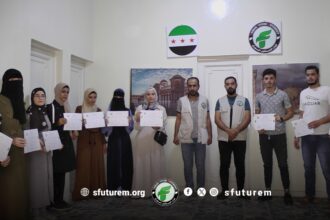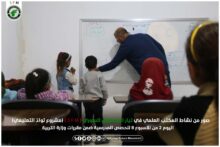After Their Arrest… “Unwavering Voices”

The Syrian regime is considered one of the most dictatorial regimes in the world that oppresses its people. It has used its security grip to punish its people after their revolt against it, with women, in particular, suffering significantly.
The regime did not respect women’s status in the Syrian societal consciousness, nor international laws calling for the respect of human rights, nor even the relevant Syrian laws. In the latest report by the Syrian Network for Human Rights (Unwavering Voices), which we have cited in the article, the report documented the martyrdom of 115 women due to torture at the hands of the conflict parties and controlling forces in Syria from March 2011 to December 31, 2023.
The report added that 2015 was the worst year in terms of the number of female victims due to torture, with all cases recorded during this period being at the hands of the Syrian regime forces at 23%, followed by ISIS, then 2012 and 2022, during which the Syrian regime was the sole responsible for all cases of female deaths due to torture.
The report also documented at least 21 women, forcibly disappeared by the Syrian regime forces, registered as deceased in the civil registry offices, from the beginning of 2018 to December 31, 2023. Additionally, it recorded at least 11 women forcibly disappeared by the Syrian regime forces, identified through leaked photos of torture victims from military hospitals “Caesar photos,” from the beginning of 2015 to December 31, 2023.
Syrian women suffered several crimes within Assad’s regime’s detention centers, including:
- Physical and psychological torture, where various types of torture such as beating, hanging, electric shocks, and threats of rape are used.
- Arbitrary arrest, as Syrian women suffered the injustice of the Syrian regime’s security and intelligence system through fabricated files and charges, often being detained for long periods, up to years, without a fair trial or even charges. The arrests of women carried out by the Syrian regime forces occurred in various ways, such as passing through checkpoints and border crossings, moving between cities, through security ambushes by various means to arrest them, raiding their homes, workplaces, universities, breaking into opposition activities such as demonstrations and protest stands, while performing humanitarian works like aiding displaced people and the injured, or through kidnapping from streets and public places, by summoning them to security branches for interrogation then arresting them, or during visits to civil detention centers to see their detained/ arrested relatives, and also after leaving areas that witnessed sieges by the Syrian regime forces, and passing through crossings established by the Syrian regime forces.
- Poor detention conditions, in terms of being deprived of healthcare and food.
- Sexual violence, used by the Syrian regime’s intelligence against the rebellious population, in addition to using rape as revenge against a Syrian component based on religion. The report by the Syrian Network for Human Rights stated that, from March 2011 to December 31, 2023, the conflict parties and controlling forces in Syria committed no less than 10,060 incidents of sexual violence targeting women, with the Syrian regime being responsible for about 75% of the recorded cases of sexual violence, followed by ISIS.
- Use as a pressure tool, including women and children to reveal individuals wanted by the Syrian intelligence.
The suffering of Syrian women after arrest:
Exiting the Syrian regime’s strongholds is considered a rebirth, yet it is an exit fraught with physical, psychological, and mental changes on one hand, and societal perception changes on the other, especially regarding women. Exiting the Syrian regime’s detention centers is considered a second suffering, especially in a male-dominated society that does not coexist with the idea of women’s arrest by merciless individuals, and the violation of their honor in detention. Hence, their suffering is evident through:
- Social discrimination, as the released woman goes through a stage of societal apprehension towards her, and the backward view in some Syrian societal patterns holds the victim responsible for what happened to her.
- Psychological tensions, as the psychological shocks and emotional obstacles lead to difficulty in adapting to life after prison.
- Legal challenges, as the Syrian regime, even if it releases its detainees, continues to extort their civil rights, making them suffer from employment difficulties or even issuing their legal documents.
4- Ongoing fears of re-arrest or constant security harassment at every event, placing women in a state of instability, leading them to consider displacement, hiding, and sometimes even suicide, as several reports have discussed.
All this suffering, among other issues, places the international community before moral and legal responsibilities to stand with the detainees in general, and particularly with detained women, both during and after detention.
What the international community provides in terms of humanitarian support for them, including minimal food and medical aid, in addition to legal support in providing protection for some of the released women and assisting them in accessing relevant international courts, political appeals supporting the rights of the detainees, and offering small projects for some cases, as well as psychological and social support, is sadly not enough to resolve the post-detention crisis of Syrian women!!
What Should Be Done?
The detained woman faces a significant challenge, and the first action should be to pressure the Syrian regime to conduct fair and transparent trials, ensure legal representation for detained women, and immediately release all women detained in security branches without charges or imprisoned to pressure their wanted relatives.
For women who died under torture, it is essential to pursue the criminal officers and personnel responsible, bring them to justice, and provide monetary compensation to their families.
The Syrian regime violated numerous articles related to women, included in the Second Protocol Additional to the Geneva Conventions of 1977, including: assault on life and physical integrity, especially murder in all its forms, mutilation, cruel treatment, torture, and assault on personal dignity, constituting a breach of Security Council Resolution 1325.
For women released by the Syrian regime, several crucial steps must be taken, of which the most important are:
1- General health support, particularly psychological support, prioritizing the issue of released women in psychological clinics, and medical associations supporting specialized post-trauma and arbitrary detention treatment clinics.
2- Economic support, by providing small or medium projects for those wishing to continue their lives, in addition to providing training and employment for women in general, especially those released.
3- Legal support through providing legal protection, and striving for justice against crimes committed against them.
4- Social support, enhancing their community participation, and spreading proper public awareness on how to treat detained women.
Conclusion:
The Syrian people suffer due to a despotic authority and the divisive chaotic reality it has created in the country, causing numerous problems. In the Syrian Future Movement’s Family Affairs Office, we chose the topic of detained and released women specifically to highlight the overall suffering of the Syrian people, men and women alike, considering women in the Syrian society as a vulnerable group. Therefore, we recommend the following:
1- Work to end the situation of arbitrary detention in Syria, in all areas under the control of de facto authorities, especially those under the Syrian regime, as it represents the most significant manifestation of the systematic oppression of the Syrian people.
2- Enhance civil awareness, especially in remote and peripheral areas, educating the Syrian people on the necessity of providing positive, special treatment to released women and avoiding negative interactions.
3- Enact laws that criminalize psychological or physical harm to released women, ensuring their legal and civil rights.
4- Encourage religious figures to clarify the religious stance on proper treatment of released women.
5- Establish associations dedicated to supporting detained and released Syrian women.
We, in the Syrian Future Movement, extend our hand to anyone willing to undertake such organized institutional work within Syria and open our offices in Afrin and A’azaz for any similar project. We put all our resources at the service of our people in general, and specifically Syrian women, prioritizing former detainees and those still languishing in prisons across Syria.
Waheeba Al-Masri
Family Affairs Office
Syrian Future Movement
References:
- The challenges facing women in Northwest Syria… A study by the Information Unit of the White Helmets – Syria Civil Defence
- The regime’s violations against Syrian women and the unfair impact of the conflict on them – Horrya Press
- Syrian female detainees.. Victims in prisons, accused in society | Women’s News | Al Jazeera
- How Syrian women deal with security risks in mediating local conflicts | UN Women – Arab States
- The continuous suffering of Syrian women on the International Day for the Elimination of Violence Against Women – Press Releases – National Coalition for Syrian Revolutionary and Opposition Forces
- Syrian women on the International Day for the Elimination of Violence Against Women (violetsyria.org)
- Empowering women and gender equality and social protection: What next? | OHCHR
- Women are essential in recovery, but their limited participation undermines the implementation of the Women, Peace and Security agenda | UN News
- Syrian female detainees.. Victims in prisons, accused in society | Women’s News | Al Jazeera
- On the International Day for the Elimination of Violence Against Women: The tenth annual report on violations against females in Syria, mostly by the Syrian regime | Syrian Network for Human Rights
- Unwavering Voices.. Syrian women faced the ordeal of their arrest and the challenges after their release | Syrian Network for Human Rights




